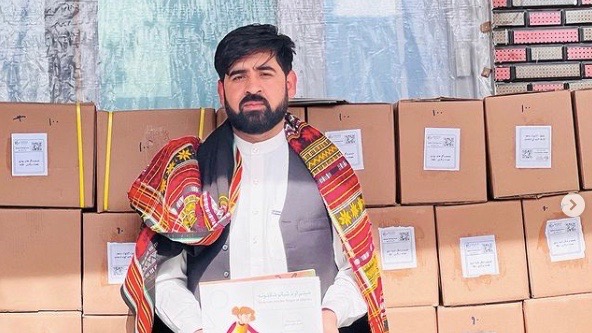A few days ago, Matiullah Wesa, a prominent social activist and founder of Pen Path, an organization dedicated to educating Afghan children, was detained by the Taliban. According to Matiullah’s brother, his recent campaign against the Taliban’s ban on girls’ education angered the Taliban.
Unfortunately, a strange transition is underway in Afghanistan. Despite distressing developments, the US, the Taliban and the international community appear to be more united than ever in their common goal towards stabilizing Afghanistan. At present, the priority of the US has shifted to battling the Islamic State from spreading its influence in Afghanistan and no other entity except the Taliban is expected to take on the group considering its barbaric methods. In crux, today, the Taliban is a reliable ally in the international community’s War on Terror. Branded by the international community as barbaric and unworthy of negotiations due to its role in sheltering Al Qaeda, the Taliban came to power in Afghanistan in 2021 with Washington’s support. This was a result of a sustained narrative directed at convincing the world that the Taliban had changed and was willing to offer similar liberties and representation to women as enjoyed under the elected regime.
Going back in time by a decade, a very different stream of thought drove the American policymaking on Afghanistan. Security was not an isolated goal but integrated with women’s empowerment as its essential element. Stability could not be envisioned without giving women the rightful space in the governance of Afghanistan. The post-9/11 phase witnessed a worldwide push to represent Afghan women in policy and media spaces. American policymakers were captured on records claiming women empowerment as part of the War on Terror. With the immense risk to their lives, Afghan women reclaimed their spaces in all aspects of policy-making and public life only with the trust that the world’s prominent democratic stakeholders stood with them. The beginning of US-Taliban talks in 2018 and the subsequent fall of Kabul in August 2021 seem to have reversed the hard work of the last two decades. Members of the former Northern Alliance, who became America’s key allies in the post-9/11 setup, were left to fend for themselves. Notwithstanding the challenges, the last two decades were beneficial for women’s socio-economic upliftment until the international community redefined the parameters of stability in Afghanistan. Social change became a secondary concern since it was decided that extremism was the bigger demon to be battled. It was ironic that the same individual who once pushed for tougher sanctions against the Taliban became Washington’s principal negotiator to smoothen out the Taliban’s return to power.
How did we arrive at this stage where the global superpowers trusted a violent group rather than their capabilities to stabilize Afghanistan? How has the Taliban been successful in changing the global perception over the last decade?
There are well-known arguments that discuss the changes in American policymaking and the bipartisan consensus on pulling out of Afghanistan, it is worth noticing how stereotypes surrounding the Pashtun identity were subconsciously invoked to legitimize the Taliban. I argue that some answers lie in Western media coverage that was replete with tropes defining Afghanistan as a graveyard of empires and the Pashtuns as a violent community. The Taliban was declared an indefatigable force that would fight any foreign force to the last man. The ideas got further impetus from the rise of extremism in Pakistan as a fallout of former President General Musharraf’s decision to aid America’s efforts in the War on Terror. As a result, similar profiling strategies were incorporated into Pakistan’s Counter Terrorism strategies as well when it launched operations against its extremist elements in the Tribal Areas bordering Afghanistan. Collectively, these tropes reinforced the perception among the US and its allies that the Taliban (a Pashtun-led movement) was not only a resilient force but could also be trusted with the monopoly of violence in bringing peace to Afghanistan. A bargain was struck and in lieu, the rights of women and minorities were traded away.
On 20th December, the Taliban announced a ban on women from accessing university education. This was followed by another ban on female staff from Non-Governmental Organizations. Today, the curriculum of schools and universities in Afghanistan has been altered. Girls have been banned from entering universities, schools, and parks. Soon, women will disappear from Afghanistan’s public life. At present, there is an undeclared apartheid against Afghan women. Yet, more than $40 million are poured into the coffers of the Taliban by Washington every week in the name of developmental assistance. One fails to understand that despite the monetary support and a tacit acceptance of the Taliban, why is the regime being denied diplomatic recognition by its benefactors? Perhaps the answer lies in the difficulty in reconciling realpolitik with ethical responsibilities. On the one hand, Washington expects the Taliban to assume a frontline role in the battle against the IS and use its leverage to prevent Russia and China from gaining a foothold in Afghanistan. In lieu, the Taliban’s social outlook and policies are reluctantly tolerated. Today, Afghanistan is far from being stable due to the rise in IS-led attacks but what is important is the realization that the Taliban was successful in projecting its utility to the international community. Far from achieving socio-economic progress or even basic security for Afghanistan’s citizens, the Taliban’s sustained rhetoric made it the sole stakeholder of Afghanistan’s destiny.
With women absent from the public sphere, an Island of ignorance is in the making in Afghanistan.
Image – Matiullah Wesa (Photo: via Social Media)

